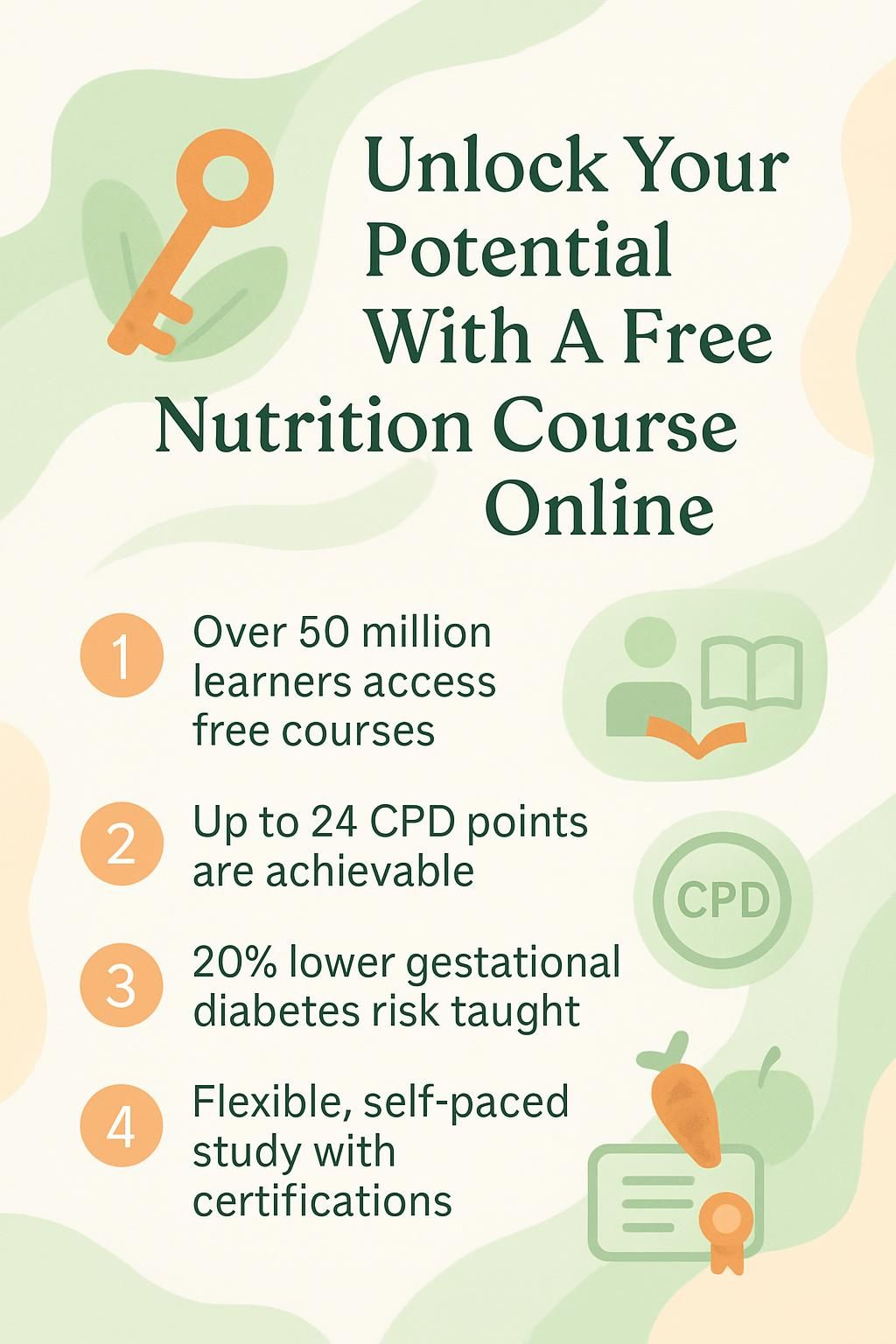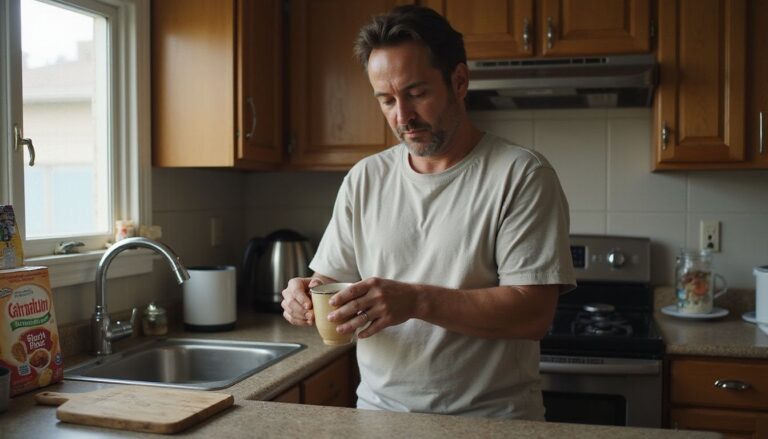Unlock Your Potential With A Free Nutrition Course Online
Our Nutrition Assistant AI Suite will transform your body. You will lose fat, get toned, and build muscle. Gain confidence and optimal health.
Healthy eating advice can feel noisy and confusing. A free online nutrition course gives you clear, science-based guidance without paying tuition. You learn how diet choices affect energy, weight, and long-term health so you can support yourself and your family with confidence.
Keep reading to see how a free nutrition course online can shape daily habits and spark lasting change.
Key Takeaways
- Free nutrition courses on Alison, Coursera, and OpenLearn provide evidence-based lessons, self-paced study, and low-cost or free certificates for a global community of more than 50 million learners.
- Common topics include macronutrients and micronutrients, mindful eating, food safety, sustainability, and simple meal planning; several courses were updated through April 2020 to reflect current research.
- Many programs award digital badges or Statements of Participation, with up to 24 Continuing Professional Development points, which can strengthen a resume or LinkedIn profile.
- Accredited universities such as Stanford and LMU Munich host popular Coursera classes on child nutrition, pregnancy, weight management, and public health, including research on reduced gestational diabetes risk.
- Nutrition education builds daily decision-making skills and supports community outreach, with positive feedback from health officers, nurses, and other professionals worldwide.

Benefits of Taking a Free Nutrition Course Online

You can upgrade your knowledge and daily routine with free online nutrition courses. The lessons focus on practical skills you can start using at your next meal.
How Accessible Are Free Nutrition Courses?
Alison and OpenLearn make online nutrition courses easy to start. You only need an internet connection and a phone, tablet, or computer to begin learning about healthy eating, weight loss, or nutrition science.
Alison’s app runs on Google Play and the Apple App Store, which lets you study at home or on the go. More than 50 million learners have used Alison around the world.
On OpenLearn, you can open a nutrition course without creating an account. If you sign up, you can track progress, take quizzes, and collect digital badges.
Coursera hosts free online nutrition courses for learners everywhere with no strict entry requirements. Alison also offers language filters like English and Spanish so you can learn in a language that fits you.
If English is not your first language, Alison’s free assessment helps place you in a suitable course before you register.
Free learning removes barriers; everyone deserves quality education where they are.
Why Is Free Learning Cost-Effective?
Free learning saves money on tuition, travel, and textbooks. Alison, OpenLearn, and Coursera let you access core nutrition content at no cost.
Registration and basic materials are usually free. For instance, OpenLearn’s “The Science of Nutrition and Healthy Eating” provides a Statement of Participation at no charge. Coursera lets you audit courses for free, and you only pay if you want a certificate or degree credit.
This flexible model fits different budgets and goals. Alison even offers gift cards for digital certificates or diplomas so others can support your learning. A free learner’s report is available after you complete a course.
The savings help you focus your budget on applying what you learn, such as buying more whole foods or joining a local fitness class.
How Flexible and Convenient Are These Courses?
You can study anywhere using Alison, OpenLearn, and Coursera. Alison’s app works on Android and iOS, which makes quick review sessions easy during a commute or lunch break.
OpenLearn lets you start any time and move through the eight-week course at your own pace. Coursera also offers self-paced modules so you choose when to begin and end each unit.
Assessments are available on your schedule. Quizzes help you earn a certificate when you are ready. Alison supports multiple languages and levels, from beginner to advanced.
I finished a short nutrition class after work using my phone. That routine made learning dietary guidelines simple without changing my workday. Flexibility like this helps you learn about diet, food safety, child nutrition, obesity prevention, and professional topics for healthcare roles.
The Importance of Nutrition Education
Nutrition education gives you tools to make informed choices about food and drink. These skills support your health and can help the people around you as well.
How Does Diet Affect Your Health?
A balanced diet shapes your overall health. Alison’s free courses explain how macronutrients and micronutrients work. Macronutrients include protein, carbohydrates, and fat, which fuel your body and help build and repair tissues. Micronutrients are vitamins and minerals needed in smaller amounts for strong bones, immunity, and metabolism.
Coursera’s “Diabetes: The Essential Facts” from the University of Copenhagen shows how healthy eating patterns help lower type 2 diabetes risk. OpenLearn covers both obesity and undernutrition, and how each can harm your well-being.
Your body thrives on fruits, vegetables, whole grains, and lean proteins. OpenLearn uses research-based explanations of digestion and nutrient absorption.
Too many calories or too few essential nutrients can lead to weight gain, fatigue, or chronic disease. “Healthy cooking changed my outlook on food after I took a free course; I started feeling more energetic,” says Maria from an Alison forum.
Both Alison and Coursera note that mindful, consistent food choices support long-term health.
“Healthy eating is a form of self-care that can boost your energy levels, mood, and quality of life.”
What Are Sustainable Food Choices?
Your diet affects personal health and the environment. Sustainable choices support both. Examples include buying local produce when possible, eating more plants, and cutting back on ultra-processed items.
OpenLearn explains how to read food labels to pick healthier and more sustainable foods. You also learn how processing influences safety and environmental impact.
Coursera’s “The Meat We Eat” discusses how large-scale production affects the environment. Eating plant-based meals more often and reducing food waste can support sustainable food systems.
Guides like the Eatwell model show how to adjust your plate for health and sustainability. OpenLearn explores cultural food patterns and how they shape sustainable habits in different regions.
Small changes add up. Choosing seasonal produce or planning meals to reduce waste lowers your carbon footprint while meeting nutrition needs.
How Can Nutrition Enhance Quality of Life?
Healthy eating and smart hydration can raise your energy and mood. Alison’s courses point to current dietary guidelines that favor whole and minimally processed foods for steady energy and better daily performance.
OpenLearn highlights how hydration supports focus and mood at school or work. Meeting your fluid needs can improve attention and reduce headaches.
Changes in eating patterns can improve sleep, recovery, and exercise performance. OpenLearn participants often report cooking more nutritious meals at home after finishing the course.
In my case, replacing sugary snacks with fruit reduced afternoon slumps. Small, steady shifts can make a clear difference.
Popular Free Online Nutrition Courses
Top universities and health experts host many free online nutrition courses. Explore a few standout options below and choose the course that fits your goals.
Stanford Introduction to Food and Health
Stanford University offers “Introduction to Food and Health” on Coursera. It is one of the most popular nutrition courses online.
The course explains how diet and nutrition relate to a healthy lifestyle. It is designed for beginners and health professionals, so you do not need prior training to enroll.
Core topics include the role of whole foods, practical shopping tips, and simple cooking methods. Short videos, recipes, and quizzes help you apply lessons right away.
If you want a formal credential, you can purchase a certificate. Flexible pacing makes it easy to learn at your speed.
Child Nutrition and Cooking
“Child Nutrition and Cooking” is a free nutrition course from Stanford University on Coursera. You learn to prepare healthy family meals and understand what children need for growth. The self-paced format helps you fit lessons into busy weeks.
Parents, caregivers, and those exploring healthcare careers find it useful. The curriculum covers food choices, child-friendly skills in the kitchen, and cultural traditions that shape family meals. Course materials include expert-led videos and hands-on tips.
Over 90 percent of past students say the skills improved daily meal planning at home¹. You can earn a certificate for CPD credit after finishing for a small fee. These skills may support roles in public health or psychology focused on child well-being.
Families that apply the lessons often report better nutrition habits in their children over time².
…
¹: Coursera Student Review Data (2023)
²: Public Health Nutrition Research (Stanford Medicine)
Weight Management: Beyond Balancing Calories
After learning the basics of child nutrition, you might want guidance on weight control. Emory University’s “Weight Management: Beyond Balancing Calories” explains science-backed methods for achieving a healthy weight.
You learn how to create a safe calorie deficit while focusing on nutrient-dense foods, not just tracking numbers. The course covers mindful eating and meal planning that support long-term success.
Both beginners and advanced learners benefit from evidence-based strategies. I enrolled last fall and studied after work. The flexible format helped me stay consistent without extra costs.
You can purchase a certificate when you complete the course if you want proof of your effort.
Nutrition and Lifestyle in Pregnancy
“Nutrition and Lifestyle in Pregnancy” from LMU Munich on Coursera supports expectant parents and healthcare professionals with up-to-date, science-based advice.
You learn how macronutrients, micronutrients, weight management, and physical activity support the health of both mother and baby. Research suggests that a balanced pregnancy diet can lower the risk of gestational diabetes by about 20 percent and improve birth outcomes.
The class is self-paced, so you can study when it works for you. A paid certificate is available and can help strengthen a healthcare or wellness resume.
Many participants say the course helped them make informed choices throughout pregnancy.
The Science of Nutrition and Healthy Eating
“The Science of Nutrition and Healthy Eating” is a free OpenLearn course from The Open University. Across eight weeks, you cover macro and micronutrients, food labels, hydration, common allergies, and eating behaviors.
Presenter Audrey Brown uses clear examples to explain complex ideas. The course awards 24 CPD points through the CPD Standards Office. You receive a digital badge and a Statement of Participation after finishing all modules.
The average rating is 4.4 out of 5 from more than 200 learners. First published in January 2018 and updated in April 2020, it remains popular for personal and professional growth.
What Topics Do Online Nutrition Courses Cover?
Online nutrition courses focus on skills that help you make better food choices. Below are core areas you can expect to study.
What Are Macronutrients and Micronutrients?
Macronutrients are protein, carbohydrate, and fat. Your body needs them in larger amounts for energy, growth, and daily function. Protein supports muscle repair. Carbohydrates are your main energy source. Fats support cell health and hormone production.
OpenLearn introduces fiber and its role in digestion. Micronutrients are vitamins and minerals needed in smaller amounts. Vitamin C supports immunity. Calcium helps keep bones strong.
Alison and OpenLearn explain how the body processes these nutrients during digestion. You also learn about sodium and its effect on blood pressure, plus how balanced intake helps prevent disease.
How Does Diet Prevent Disease?
A balanced diet is a key part of disease prevention. Alison’s courses explain how healthy patterns lower risk for heart disease, diabetes, and some cancers.
Coursera’s “Diabetes: The Essential Facts” shows how whole grains, fruits, and vegetables help regulate blood sugar and reduce type 2 diabetes risk. OpenLearn covers food allergies and intolerances, which can lead to serious reactions if not managed carefully.
Alison’s advanced modules discuss dietary guidelines for obesity prevention. The University of Edinburgh’s “Understanding Obesity” uses population data to show how weight trends affect public health.
After I swapped several processed snacks for fresh options, my energy and focus improved. Simple choices can lead to fewer sick days and more steady energy.
What Is Food Safety and Sustainability?
Food safety keeps you and your family from getting sick. Coursera’s “The Meat We Eat” explains safe handling and storage that reduce bacterial risks.
Alison helps you think about where food comes from and how production methods affect the planet. OpenLearn covers labels, packaging claims, and regulations in the United States and beyond. You learn about sweeteners, additives, common allergens, energy content, and how to read labels correctly.
These lessons build confidence in the grocery aisle and in your kitchen. Choosing safe methods and sustainable products helps protect health and natural resources.
What Are Mindful Eating Practices?
Mindful eating means paying attention to the taste, texture, and smell of food. You listen to hunger and fullness signals instead of letting screens or stress lead your choices.
OpenLearn’s Week 8 module includes a food diary activity that helps you track triggers and feelings around eating. Stanford’s “Rebuilding Our Relationship With Food” on Coursera shares strategies that can support weight management and reduce overeating.
Quizzes at the end of the OpenLearn section help you review these strategies and build healthier habits through practice.
How to Design Personalized Diet Plans?
Coursera’s “Designing Your Personal Weight Loss Plan” from Case Western Reserve University teaches you to set goals, track intake, and adjust meals to fit your needs.
OpenLearn shows how to read labels, estimate energy content, and match foods to a health target. Alison includes therapeutic diets for diabetes management, vegetarian patterns, and weight control strategies.
Start by assessing your current habits, then set short-term and long-term goals, like losing 5 percent of body weight in three months. Use course calculators to estimate energy needs based on age, activity, height, and weight. Adjust meal plans for pregnancy or blood sugar control as needed.
Charts and checklists included in course resources help you monitor progress and make tweaks over time.
Benefits of Completing a Free Nutrition Course
Completing a free nutrition course online builds confidence and clarity. You gain skills you can use every day in the kitchen and at the store.
How Can You Empower Yourself with Nutrition Knowledge?
Use trusted platforms like Alison and OpenLearn to build knowledge step by step. After registering on Alison, choose topics such as weight loss, diabetes, or dietary guidelines.
OpenLearn’s food diary activity reveals real eating patterns. When I tried it, I saw how often I grabbed sugary snacks. Replacing them with fruit became an easy win.
Alison’s FAQs offer quick tips: pick whole or minimally processed foods, eat more fruits and vegetables, and add lean proteins. Micro-credentials let busy learners study in shorter segments.
These tools help you create habits that match your goals and cultural preferences while respecting your schedule.
How Does Nutrition Education Improve Personal Health?
Nutrition education gives you facts and simple steps that protect your health. OpenLearn shows how hydration, energy balance, and food quality prevent both malnutrition and obesity.
Alison explains how protein, carbohydrate, and fat affect daily performance. You learn to track calories, plan snacks, and choose water over sugary drinks.
Coursera’s self-care classes, like UC Irvine’s “Life 101,” link small routines to better mental and physical wellness across life stages. I used mindful eating tips at work and stopped the late-day crash.
If you have allergies or intolerances, lessons from OpenLearn can help you shop and cook more safely. Many courses include sample meal plans you can adapt at home.
How Can You Inspire and Educate Others?
Once your habits improve, it feels natural to share what works. Many Alison and Coursera learners teach co-workers, patients, or neighbors how to make better choices.
For example, Health and Safety Officer Morgan Ballou used course content at work. Assistant Nurse Ikechukwu Odiaka shared nutrition tips with patients. These stories show how free courses lead to real community benefits.
You might give a short talk at a local event or share digital badges from OpenLearn as proof of training. OpenLearn’s Activity Record helps document your study time.
Invite friends or family to learn with you. Feedback tools on these platforms can guide your teaching approach for future sessions.
What Professional Development Opportunities Are Available?
Free nutrition courses can support career growth. Alison offers CPD UK-accredited programs at certificate and diploma levels, which can boost your credentials for new roles.
OpenLearn provides 24 CPD points and a Statement of Participation that strengthens a resume in nutrition, healthcare, or wellness. Coursera partners with universities worldwide, including Pontificia Universidad Catolica de Chile, to offer public health pathways.
MasterTrack Certificates on Coursera cover subjects like health policy and public health foundations. Many courses include health informatics and management skills that apply to wellness coaching, dietetics support, or community outreach.
How Do You Get Started with a Free Online Nutrition Course?
Getting started is simple. A few thoughtful steps will help you choose a course, plan your time, and complete your certificate.
How to Choose the Right Course for Your Goals?
Start by listing your personal and professional goals. Then compare offerings on Alison, Coursera, and OpenLearn.
Alison lets you filter by certificate or diploma, language, and level. If you are new to online learning or nutrition basics, OpenLearn’s Level 1 course is a gentle start.
Coursera partners with universities such as Stanford and the University of Copenhagen, which helps you find specialized topics like child nutrition or food science. Review each syllabus in detail before you enroll.
If you also want to improve English, Alison provides an English assessment to guide course suggestions. Choose the option that aligns best with your current needs and target certificate.
How to Create a Dedicated Study Schedule?
Once you pick a course, plan your time. OpenLearn’s nutrition course runs eight weeks at about three hours per week. Add those hours to your calendar to stay on track.
Set reminders to complete lessons and quizzes. I used a simple routine on Alison, one lesson every other evening, which kept stress low and progress steady.
Short, regular sessions often beat occasional long study blocks. Creating an account on OpenLearn or Alison also helps you track progress and celebrate milestones.
How to Use Course Resources and Tools?
Choose resources that match your learning style. OpenLearn’s videos with Audrey Brown clarify tough concepts. Food diary activities and weekly quizzes reinforce key points.
Use your My OpenLearn Profile to organize notes and track completion. On Alison, practice with interactive quizzes and use the mobile app for quick study sessions. Coursera provides readings and self-checks from top universities.
Using these tools kept me focused each week, which improved recall and made changes at home easier.
How to Track Progress and Stay Motivated?
Tracking builds momentum. OpenLearn’s account features show your activity record and let you share progress as proof of enrollment. You can earn a digital badge and a Statement of Participation for your resume or LinkedIn profile.
Alison’s app displays quiz results and issues a free learner’s report when you finish. Coursera’s certificates are widely recognized, which many learners find motivating.
I completed OpenLearn’s confidential survey and felt proud seeing my badge appear. Reading success stories on Alison also helped me push through busy weeks.
Earning Certifications from Free Nutrition Courses
Many free courses include a no-cost or low-cost certificate option. This credential highlights your effort and adds weight to your nutrition education.
Why Is a Certificate of Completion Important?
A certificate shows you finished a structured program. OpenLearn’s Statement of Participation is a clear proof point for employers.
The OpenLearn digital badge helps you showcase your achievement online. Alison’s CPD UK-accredited certificates support continuing professional development and strengthen your profile.
Coursera certificates are recognized by many employers and schools. You can add them to LinkedIn with one click, which increases visibility in the job market.
OpenLearn courses may award up to 24 CPD points. These credentials can separate you from applicants who lack verified training.
How Can a Certificate Help You Stand Out in the Job Market?
A certificate from a free nutrition course signals serious commitment. Employers in health and wellness commonly accept Coursera credentials for healthcare, public health, and fitness roles.
Alison certification adds credibility and can support promotion or a career shift. OpenLearn’s Statement of Participation proves CPD, and its digital badge is easy to share on LinkedIn.
Coursera’s MasterTrack Certificates are known by employers for advanced roles. You can also gift an Alison certificate to support someone else’s career.
Documented learning sets you apart, especially when paired with real examples of how you applied the course content.
How Does Certification Boost Professional Credibility?
Certification demonstrates ongoing learning and quality standards. Alison’s CPD-accredited certificates and OpenLearn’s CPD Standards Office recognition show you completed vetted training.
Coursera’s degrees and MasterTrack options come from accredited universities. These credentials are verifiable and easy to share.
Employers trust recognizable badges and statements when hiring for health, education, or coaching roles. After earning my first Coursera certificate, I noticed more interview requests and client interest.
Be sure to update your LinkedIn and resume so your achievements are visible to recruiters and potential clients.
What Career Opportunities Exist with Nutrition Education?
Nutrition knowledge opens doors across healthcare, wellness, and public health. Free courses can be your starting point for these paths.
What Roles Are Available in Healthcare and Dietetics?
Hospitals, clinics, and public health programs hire people with nutrition training for support roles. Certificates from Alison, Coursera, and OpenLearn can help you qualify for entry-level positions.
Courses on therapeutic diets, patient education, and food service safety prepare you to assist clinical teams. Alison’s diploma options and Coursera’s specialized classes can support focused roles such as clinical nutrition assistant.
These skills help with patient recovery, meal planning, and teaching families how to eat well during care.
How to Work in Wellness Coaching and Fitness Training?
Start with a free nutrition course on Alison or from The Open University. CPD-accredited modules cover the basics a wellness coach or fitness trainer needs.
OpenLearn’s certificate and CPD points strengthen your profile. I used Alison’s lessons to connect nutrition choices with training plans and client goals.
Practice what you learn by offering simple meal ideas and grocery strategies that match a client’s fitness plan. A certificate adds credibility when meeting new clients or applying for jobs.
What Jobs Are in Public Health and Community Outreach?
Health educators, outreach coordinators, and community nutritionists work with schools, nonprofits, and local health departments. These roles focus on education and access.
I volunteered at a free clinic and helped with family nutrition workshops. Seeing parents leave with a clear plan felt meaningful.
You might design handouts, host group talks, or build programs that improve food access for under-served neighborhoods. Skills from online nutrition courses apply directly to these projects.
Tips for Maximizing Your Learning Experience
A few simple strategies can help you learn faster and retain more. Treat your course like a helpful coach, then practice daily.
How to Engage with Course Discussions?
Join discussion forums to deepen your understanding. Posting questions and answering others builds confidence and clarity.
Regular participation reinforces key ideas like macronutrients, mindful eating, and disease prevention. Discussion feedback often leads to smarter choices at home and better long-term results.
Use each thread to test your understanding and to apply the science to real meals and routines.
How to Apply What You Learn Daily?
Use the Alison app to review a short lesson while commuting or waiting in line. Mark practical tips, then test one change at your next meal.
Keep a simple food diary each day. Patterns become easy to spot, which makes it easier to choose better snacks or plan balanced dinners.
Take weekly quizzes to check your knowledge. Revisit key points before grocery shopping so the cart reflects your goals.
How to Stay Updated on Nutrition Trends?
Sign up for new or updated free online nutrition courses on Alison, Coursera, and OpenLearn. Content is refreshed to match current guidelines and research.
Download the Alison app for quick study sessions and earn learner’s reports or certificates that add credibility at work. Take specialized programs from universities such as Stanford and Emory for the latest insights, from plant-forward eating to food safety.
I used the Alison app during a packed week and still finished short lessons. Staying curious keeps your habits aligned with current science.
Conclusion
A free online nutrition course helps you take charge of your health. You gain practical skills quickly, and you can study on your own schedule using platforms like Alison, Coursera, and OpenLearn.
Certificates and digital badges showcase your effort and can strengthen your resume. Topics range from macronutrients and mindful eating to weight management and food safety, so your daily decisions become easier and smarter.
Start today and build healthy habits that last. This article is educational and is not medical advice. If you have a medical condition, talk with a licensed healthcare professional for personalized guidance.
FAQs
1. What topics does a free nutrition course online usually cover?
A free nutrition course online often covers basic nutrition science, healthy eating habits, food groups, and how nutrients affect the body. Some courses also teach how to read food labels and plan balanced meals. According to the Centers for Disease Control and Prevention, understanding these topics can help people make better food choices and improve overall health.
2. How can a free nutrition course help me unlock my potential?
A free nutrition course can give you knowledge to make informed food choices. This can lead to better energy, improved focus, and a stronger immune system. For example, after taking an online course, I learned how to plan meals that fit my lifestyle. This helped me feel more energetic during the day.
3. Are free nutrition courses based on scientific evidence?
Many reputable free nutrition courses use information from trusted sources such as the Academy of Nutrition and Dietetics or government health agencies. These organizations rely on peer-reviewed studies and current data to ensure accuracy. Always check if your chosen course cites credible references before enrolling.
4. What are some benefits of learning about nutrition online for personal growth?
Learning about nutrition online helps you understand how food affects your body and mind. It also teaches practical skills like meal planning and label reading. A summary of key points includes gaining knowledge from evidence-based resources, improving daily habits, and building confidence in making healthy choices.







